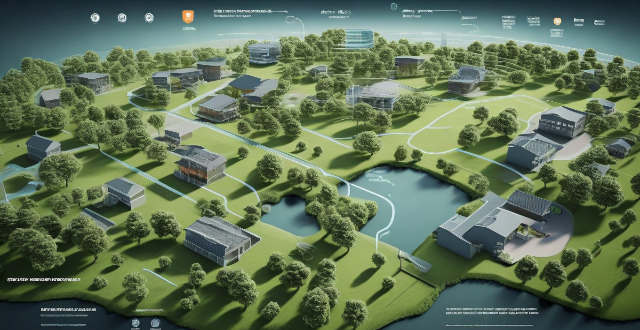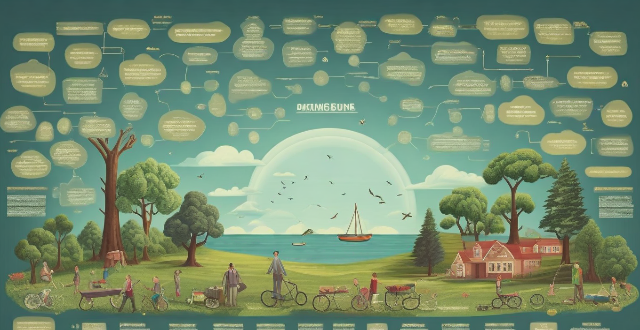Environmental Protection

How can ecological protection areas contribute to environmental education and awareness ?
Ecological protection areas are crucial for both biodiversity conservation and environmental education. These areas offer hands-on learning experiences, interactive programs, sustainable practice promotion, community outreach, research efforts, and media publicity to raise awareness about the importance of preserving ecosystems. Through these initiatives, ecological protection areas can inspire individuals to adopt eco-friendly habits and contribute to global conservation efforts.

How do international trade agreements influence environmental policies and sustainability efforts ?
International trade agreements significantly influence environmental policies and sustainability efforts through harmonization of standards, potential for environmental dumping, promotion of green trade practices, and challenges in balancing trade liberalization with environmental protection. These agreements can either elevate global environmental standards or lead to a race to the bottom in regulatory protections. Policymakers must navigate the complexities of these agreements to ensure they support sustainable development goals without undermining environmental commitments.

What are the benefits of establishing ecological protection areas ?
Ecological protection areas are vital for preserving biodiversity, mitigating climate change, and conserving soil and water. They also promote sustainable resource use, offer opportunities for ecotourism and environmental education, maintain cultural and spiritual values, provide economic benefits, and foster international cooperation. These protected zones contribute to global conservation efforts and demonstrate leadership in environmental stewardship, making them essential for the survival of species and the wellbeing of human communities reliant on natural resources.

How has environmental legislation evolved over time ?
Environmental legislation has evolved over time, reflecting growing awareness of environmental issues. Early stages focused on preserving natural resources and conserving wildlife habitats, while post-World War II saw a shift towards pollution control through air and water quality regulations. The late 20th century introduced comprehensive environmental protection laws addressing multiple aspects of environmental degradation. Today's legislation prioritizes sustainable development and climate change mitigation, with a focus on public participation and transparency in decision-making processes.

Can environmental legislation effectively reduce pollution ?
Environmental legislation has the potential to effectively reduce pollution, but its success depends on various factors such as enforcement and compliance, public awareness and participation, technological innovation, political will, international cooperation, and economic considerations. Strong regulatory bodies, education campaigns, investment in clean technology, government prioritization of environmental protection, global collaboration, and balancing environmental goals with economic development are all crucial for the effectiveness of environmental legislation. Achieving lasting improvements in environmental quality requires ongoing effort from all sectors of society.

What role do data protection officers play under data protection laws ?
Data protection officers (DPOs) are crucial for ensuring compliance with data protection laws in organizations. They advise on compliance, develop policies, ensure adherence to regulations, educate stakeholders, and act as a point of contact for personal data requests.

What are the legal frameworks and policies supporting the establishment of ecological protection areas ?
The establishment of ecological protection areas is supported by various legal frameworks and policies that aim to conserve biodiversity, protect ecosystems, and promote sustainable development. These frameworks and policies are essential for ensuring the effective management and protection of ecological protection areas. Some key legal frameworks and policies supporting the establishment of ecological protection areas include international legal frameworks such as the Convention on Biological Diversity (CBD) and the United Nations Convention to Combat Desertification (UNCCD), national legal frameworks such as National Biodiversity Strategies and Action Plans (NBSAPs) and national environmental policies, regional legal frameworks such as regional conservation agreements, and sector-specific legal frameworks such as forestry laws and regulations and wildlife conservation laws and regulations. When establishing ecological protection areas, it is essential to follow best practices such as conducting thorough scientific research, engaging local communities in the planning and management process, developing clear management plans, monitoring ecological protection areas regularly, and promoting sustainable tourism activities within them.

Can ecological protection areas help mitigate the impacts of climate change ?
Ecological protection areas can mitigate climate change impacts by carbon sequestration, habitat preservation, water conservation, soil erosion control, and nutrient cycling. These areas safeguard biodiversity, protect natural resources, and preserve ecosystem functions. They help reduce atmospheric CO2 levels, provide refuge for species adapting to changing environmental conditions, maintain stable water levels, filter pollutants from water sources, control soil erosion, and promote nutrient cycling processes. Supporting and expanding ecological protection areas is crucial for a sustainable future.

What is the importance of understanding material safety data sheets (MSDS) in chemical handling and protection ?
The text discusses the importance of understanding Material Safety Data Sheets (MSDS) in chemical handling and protection. It explains what an MSDS is, its significance for health and safety, compliance with regulations, environmental protection, and risk management. The article emphasizes that understanding MSDS is crucial for workers and employers to ensure a safe and healthy work environment.

What innovative technologies are being developed for environmental protection ?
Innovative technologies for environmental protection include solar power, wind energy, electric vehicles (EVs), smart grid technology, recycling and waste management, and green building design. These technologies aim to reduce greenhouse gas emissions, air pollution, and waste generation while promoting the use of renewable energy sources. They offer advantages such as sustainability, reduced dependence on fossil fuels, improved efficiency, and lower maintenance costs.

How should we prioritize the protection of endangered species and ecosystems ?
The protection of endangered species and ecosystems is a critical issue that requires immediate attention. Here are some strategies we can employ to prioritize their protection: 1. Conduct comprehensive surveys and studies to identify and understand the current state of endangered species and ecosystems. 2. Develop effective legislation and policies, such as establishing protected areas, regulating hunting and fishing, and promoting sustainable development. 3. Raise public awareness and involvement through education programs, community involvement, and media campaigns. 4. Collaborate internationally by signing international agreements, sharing knowledge and resources, and coordinating conservation efforts. By taking these steps, we can work towards ensuring the survival of our planet's diverse flora and fauna for future generations.

Can you explain the importance of continuous environmental monitoring ?
The article emphasizes the importance of continuous environmental monitoring, which involves regularly collecting data on various environmental factors such as air and water quality, soil conditions, and biodiversity. It helps identify potential issues early on, track long-term changes, support conservation efforts, enhance public awareness, and facilitate research and innovation. The author encourages everyone to stay informed about the state of their local environment and take action to protect it.

How does environmental legislation differ across countries ?
Environmental legislation varies across countries due to differences in economic development, political systems, cultural values, and environmental priorities. The legal framework for environmental protection ranges from comprehensive laws covering various issues to piecemeal legislation addressing specific problems. Enforcement mechanisms also differ, with some countries having strong regulatory bodies and others lacking institutional capacity or political will. Penalties and sanctions for non-compliance vary widely, as do opportunities for public participation in decision-making processes. International cooperation is crucial but varies in commitment and action among countries. Overall, these differences highlight the need for greater coordination and cooperation to address global environmental challenges effectively.

What is the role of education in promoting environmental awareness and action ?
Education plays a crucial role in promoting environmental awareness and action by providing knowledge about the environment, developing environmental values, encouraging active engagement, teaching problem-solving skills, and providing opportunities for leadership development.

Can you explain the concept of "radiation shielding" and its importance in radiation protection ?
Radiation shielding plays a critical role in radiation protection by using materials to absorb or deflect harmful radiation, thus reducing exposure levels. This concept is essential in industries such as nuclear power generation, medical imaging, and space exploration, where high radiation levels pose risks. Radiation shielding is important for human health protection, safety in nuclear facilities, medical applications, space exploration, and environmental conservation. Various materials are used for radiation shielding, including lead, concrete, water, polyethylene, tungsten, and boron, each effective against specific types of radiation.

What is the role of individuals in addressing climate change and environmental degradation ?
This article discusses the role of individuals in combating climate change and environmental degradation. It highlights the cumulative impact of individual actions, their potential to inspire others, and the political pressure they can exert. The article provides practical steps individuals can take, such as reducing their carbon footprint, supporting renewable energy, waste reduction and recycling, advocating for environmental policies, and spreading awareness. It emphasizes that collective efforts can make a significant difference in creating a more sustainable future for our planet.

What role do governments play in promoting sustainable development ?
The article discusses the various ways governments can contribute to sustainable development, including leadership and policy-making, education and awareness, infrastructure and investment, regulation and enforcement, and collaboration and partnership. Governments are responsible for setting national policies and priorities that guide the actions of their citizens and businesses, promoting sustainable development through education and public awareness campaigns, investing in infrastructure projects that support environmental protection, energy efficiency, and renewable energy sources, enforcing existing laws and regulations related to environmental protection, resource management, and social equity, and working together with other levels of government, the private sector, civil society, and international organizations to achieve common sustainability goals.

What are the best iPhone cases for protection ?
The best iPhone cases for protection include the OtterBox Defender Series, Spigen Tough Armor, UAG Monarch, Speck Presidio2 Pro, Case-Mate Tough Groove, and Incipio Duo. These cases offer features such as durability, drop protection, slim design, military-grade protection, grip, scratch resistance, Microban antimicrobial technology, dual-layer design, impact absorption, two-tone design, and precision fit. Consider these factors when selecting an iPhone case to ensure optimal protection for your device.

What are the key components of environmental legislation ?
The article discusses the key components of environmental legislation, which are designed to protect the environment and promote sustainable development. These include Environmental Impact Assessment (EIA), Pollution Control Laws, Conservation Laws, and Sustainable Development Policies. The EIA process involves screening, scoping, reporting, review, and monitoring to identify and mitigate potential adverse impacts of proposed projects on the environment. Pollution control laws regulate emissions and discharges into air, water, and land to prevent pollution and protect public health and the environment through emission standards, discharge permits, and waste management regulations. Conservation laws aim to protect endangered species, habitats, and ecosystems from destruction or degradation caused by human activities through protected areas, species protection, and habitat restoration measures. Sustainable development policies focus on balancing economic growth with social equity and environmental protection to meet present needs without compromising future generations' ability to meet their own needs through integrated planning, resource efficiency, and fostering a green economy. Overall, environmental legislation plays a crucial role in protecting our planet's natural resources and ensuring sustainable development for future generations.

How does climate justice relate to environmental racism ?
This text discusses the interconnected reality of climate justice and environmental racism. It defines both terms, outlines their intersection in terms of historical and structural inequities, disproportionate impacts, mitigation and adaptation inequities, and exclusion from decision-making processes. It then proposes solutions to address this intersection, including promoting participatory democracy, equitable allocation of resources, enforcing environmental justice legislation, and building resilience through education and capacity building. Overall, it emphasizes the need for a more equitable approach to environmental protection and climate action that recognizes and challenges the root causes and impacts of environmental racism within the broader context of climate justice.

How does education contribute to raising environmental awareness among future generations ?
Education is crucial for raising environmental awareness among future generations, as it enhances knowledge, develops values, and promotes action. Incorporating environmental education into the curriculum empowers students with the necessary tools to understand and address complex challenges facing our planet. By fostering a deeper appreciation for nature and cultivating a sense of responsibility towards preserving it, schools can play a significant role in nurturing eco-conscious citizens who are well-equipped to confront and overcome environmental challenges.

What role does technology play in improving environmental monitoring ?
Technology plays a pivotal role in enhancing environmental monitoring by enabling advanced data collection, analysis, visualization, reporting, and conservation efforts. Satellite imagery, drone surveillance, sensor networks, big data analytics, GIS, real-time reporting systems, and early warning technologies are among the key tools used. These advancements not only improve our understanding of environmental changes but also aid in managing resources and raising public awareness about ecological issues.

How can we balance economic growth with environmental sustainability ?
Balancing economic growth with environmental sustainability requires a multifaceted approach that includes promoting green infrastructure and renewable energy, encouraging sustainable business practices, fostering innovation and technology development, educating and engaging stakeholders, and implementing policies and regulations. By taking these steps, we can create a more sustainable future where economic prosperity coexists with environmental well-being. Achieving this balance will require ongoing effort from all sectors of society, including governments, businesses, communities, and individuals alike.

What role do citizens play in shaping environmental legislation ?
The text discusses the significant role that citizens play in shaping environmental legislation. It outlines various ways in which they can influence such legislation, including advocacy and public awareness, voting and elections, lobbying and policy influence, litigation and legal action, and grassroots movements and direct action. The text emphasizes that by working together, citizens can help create a more sustainable future for themselves and future generations.

What is the difference between data privacy and data protection ?
The text discusses the difference between data privacy and data protection, emphasizing that understanding these concepts is crucial for managing personal information responsibly. Data privacy focuses on individual rights to control personal information, while data protection emphasizes organizational measures to safeguard that information. Both are essential for building trust and ensuring responsible data handling.

What is the General Data Protection Regulation (GDPR) ?
The General Data Protection Regulation (GDPR) is a comprehensive data privacy law that governs how personal information is collected, processed, and stored by organizations within the European Union (EU). It was designed to protect the rights of individuals and ensure their personal data is handled securely and transparently. Key features of GDPR include data minimization, consent, transparency, data portability, right to erasure, data protection officers (DPOs), and penalties for non-compliance. Benefits of GDPR compliance include enhanced trust between organizations and customers, risk mitigation through strong data protection measures, competitive advantage in the EU market, and increasing global relevance as other countries adopt similar laws. Challenges of GDPR compliance include complexity, cost, cultural differences leading to confusion and potential non-compliance, and technological limitations. In conclusion, the General Data Protection Regulation (GDPR) is a crucial piece of legislation that aims to protect the privacy rights of individuals within the European Union. While it presents both benefits and challenges for organizations, compliance with GDPR has become an essential aspect of modern business operations in today's digital age.

How do hazmat suits provide protection against chemical exposure ?
Hazmat suits, also known as chemical protective clothing or chemical resistant suits, are specialized garments designed to protect wearers from hazardous materials. These suits offer a high level of protection against chemical exposure by creating a barrier between the wearer and the environment. The key features of hazmat suits include their material, design, breathability, and comfort. The article discusses how hazmat suits provide protection against chemical exposure in detail, including the levels of protection offered by different types of suits.

What role does environmental ethics play in sustainable development ?
The text discusses the significance of environmental ethics in sustainable development, emphasizing its role in recognizing the importance of the environment, promoting stewardship and responsibility, encouraging sustainable practices, addressing environmental justice issues, and fostering collaboration and partnerships. It highlights that by understanding the interconnectedness of all life on Earth, we can make more informed decisions about how to use and protect natural resources. The text also points out that environmental ethics promotes the idea of stewardship, which involves taking responsibility for protecting and preserving the environment for future generations. Furthermore, it encourages sustainable practices such as recycling, reducing carbon emissions, and using eco-friendly products to reduce our impact on the environment and contribute to long-term sustainability. Additionally, the text emphasizes the importance of addressing environmental justice issues to ensure fair access to natural resources and protection from environmental harm. Finally, it suggests that environmental ethics fosters collaboration and partnerships between individuals, communities, governments, and businesses to work together towards sustainable development goals.

Do clear iPhone cases provide as much protection as opaque ones ?
Clear and opaque iPhone cases both offer protection but differ in durability, drop resistance, and design. Clear cases showcase the phone's design but may scratch more easily, while opaque cases often provide better impact absorption and come in various colors and textures. Materials like polycarbonate, TPU, silicone, rubber, plastic, and metal contribute to the protective qualities of each type. The choice between clear and opaque cases depends on personal preference and desired level of protection.